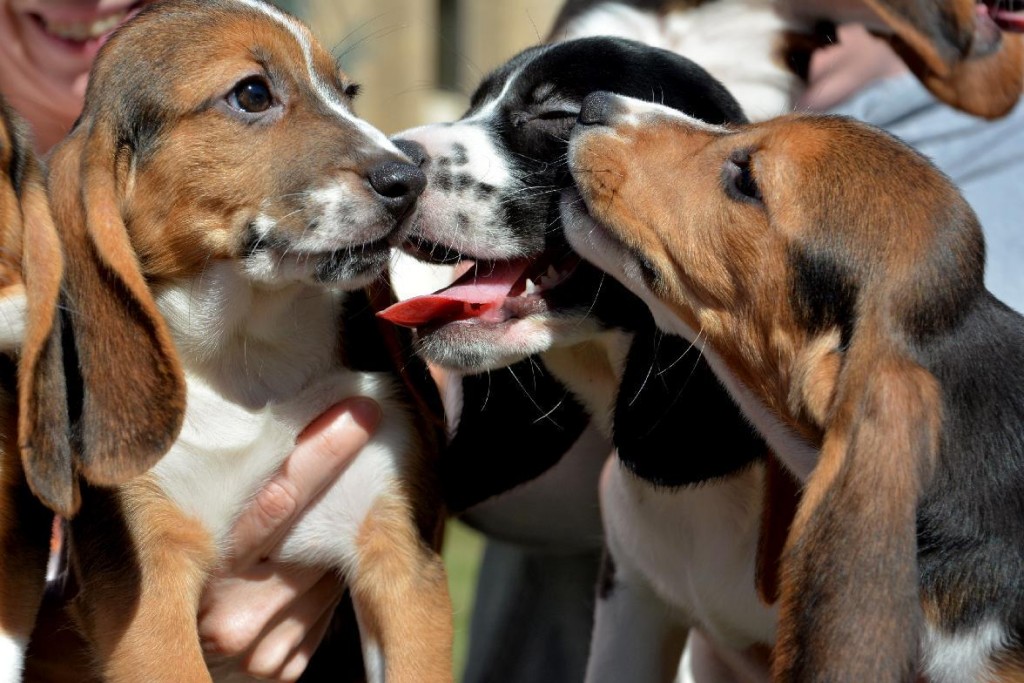7 mutts become world’s first test-tube puppies

This Sept. 29, 2015, photo provided by Cornell University College of Veterinary Medicine shows seven week-old puppies born by in vitro fertilization at the Baker Institute for Animal Health in Ithaca, N.Y. The advancement opens the door for conserving endangered species of canids and for eradicating heritable diseases in dogs. (Michael Carroll/Cornell University College of Veterinary Medicine via AP)
NEW YORK—Rarely is a major scientific breakthrough so darn cute.
A team of veterinarians, scientists and lab workers gathered around a surrogate hound and watched her give birth to seven half-pound puppies, the first dogs ever conceived in a test tube.
“We each took a puppy and rubbed it with a little towel and when it started to squiggle and cry, we knew we had success,” said Dr. Alexander Travis, who runs the lab at Baker Institute for Animal Health at Cornell University’s College of Veterinary Medicine.
“Their eyes were closed. They were just adorable, cute, with smooshed-in faces,” he said.
It was the first litter of puppies born through in vitro fertilization (IVF). The results were published in the science journal Plos One.
IVF, the process of fertilizing an egg with sperm outside the body, is widely used to assist human reproduction. The first human birth from IVF took place in 1978.
But IVF efforts with dogs repeatedly failed until now, according to Dr. Pierre Comizzoli, a reproductive physiologist for Smithsonian Conservation Biology Institute.
The puppies born July 10 are a mix of beagle, Labrador and cocker spaniel and are now healthy 5-month-olds, Travis said.
Red and Green
The lab kept track of the puppies by painting their nails with different color polish. Travis adopted two, known by their nail polish names, Red and Green.
“The biology of the dog is really, really different than humans,” Comizzoli said. Dog pregnancies last only two months and females go into heat just once or twice a year, releasing immature eggs instead of mature eggs needed for IVF.
An earlier experiment helped pave the way. In 2013, Klondike became the first puppy born from a frozen embryo.
Klondike’s beagle mother was fertilized using artificial insemination. Her embryos were collected, frozen and implanted in Klondike’s surrogate mother.
Comizzoli described the birth of the seven puppies “as a huge breakthrough.”
The technique could eventually be used to help breed endangered species in captivity, Travis said.
Preventing diseases
He also said the development opened the door to detecting genetic traits that lead to disease and fixing them preemptively.
“Instead of trying to cure disease, we can help prevent it from happening in the first place,” he said.
The paper, whose lead author was Jennifer Nagashima, a fellow at Smithsonian Institute, said the research could shed light on the genetic basis for numerous disorders that affect dogs and humans.
Dogs share more than 350 similar heritable disorders and traits with humans, according to the paper.
“Since the mid-1970s, people have been trying to do (it) in a dog and have been unsuccessful,” Travis said.
Female dogs only ovulate once or twice a year and their eggs tend to be less mature at that stage, according to the research paper.














